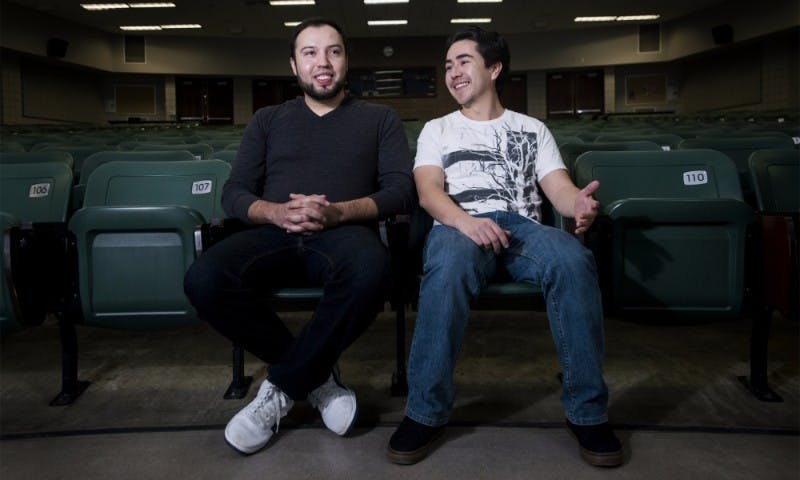The Deferred Action for Childhood Arrivals, or DACA, program will end next March, President Donald Trump announced Tuesday.
Instituted in 2012 under President Barack Obama, DACA aids undocumented immigrants who came to the United States as children by allowing work authorization and delaying any prosecutorial removal action for a renewable term of two years.
“It wasn’t until last week that I realized, wow, this is really hitting us like a bucket of cold water,” doctoral student José Badillo Carlos said.
Badillo Carlos and doctoral student Osvaldo Sandoval were able to apply to the PhD program at MSU because of DACA and the Development, Relief and Education for Alien Minors Act, or the DREAM Act, which provide them with renewable temporary legal residency.
“It definitely is a stressful time right now," Badillo Carlos said. "With the administration's decision, we’re no longer going to be able to renew it. That means we’re no longer going to be able to continue our education, continue working. We have to figure out how to survive when all we want to do is educate ourselves."
The MSU administration issued a statement on Sept. 5 in opposition of the program’s termination.
According to the statement, MSU joined more than 600 colleges and universities last November in signing a statement in support of the DACA program and undocumented immigrant students.
“Michigan State’s support for these young immigrants, who are students at this and other universities, is unwavering,” the statement reads. “We will continue to support their aspirations as we monitor developments.”
MSU is once again joining its colleagues in urging congressional leaders to coordinate a bipartisan plan to “ensure, at a minimum, that protections currently afforded to undocumented students are continued.”
Trump gave Congress six months to make a final decision on the executive order.
“It’s nice to have the support,” Sandoval said. “It helps us morally and gives us the strength to continue but it’s still hard to depend for someone else to make a decision for us within six months... It would be nice to know now what’s going to be the decision so we can plan our futures."
Sandoval's work permit expires on May 4 and if the decision to terminate DACA is final, he will be unable to renew it.
“Now I have to rush to try to finish my dissertation before May 4, which is the legal timeframe that I have left,” Sandoval said. “If we survived before, we can survive now, but we went into the Ph.D (program) because we just wanted to get a degree, to (become educated).This is what we enjoy, we want to contribute to society and to our community. We can still live and survive undocumented, but that’s not the point, our education goes nowhere without the work permit or the legal status.”
State officials and Michigan politicians continue to voice their opinions on the decision, many in opposition and urging Congress to pass an act protecting those affected.
Governor Rick Snyder joined the later group in a statement issued Tuesday.
“Many are working toward success under the existing DACA, and for the certainty of their future Congress should act quickly to authorize and clarify their status,” Snyder’s statement read. “In Michigan we will continue to honor everyone’s journey who has become part of our family of 10 million people, and remain the most welcoming state in the nation for immigrants and dreamers seeking prosperity, a home and a community that is accepting of their family and their desire to succeed in America.”
Support student media!
Please consider donating to The State News and help fund the future of journalism.
According to MSU’s statement, President Lou Anna K. Simon has signed a letter making its way around the Association of American Universities leadership insisting an immediate and permanent statement that those affected by DACA will not be deported.
“We believe that the nation’s competitiveness is likewise strengthened by the presence of this motivated and deserving group of immigrants,” MSU’s statement read. “Those brought to the United States as children and who grew up in the United States, knowing no other country, should be allowed to pursue their dreams here and to contribute to our society. That is the right and fair thing to do, for them and for the nation.”
Sandoval and Badillo Carlos had plans to continue their work and studies, but their futures are now in jeopardy.
“We’re trying to better the community, better our lives, and with this it’s just hard to continue, it’s hard to focus on our own classes, our own research, our own teaching here,” Badillo Carlos said.
Sandoval says he’ll do everything he can to finish his degree.
“That’s my goal, to stay in academia, in the school system. That’s my final goal,” Sandoval said. “If not, I have no idea. If I go back to Mexico, I don’t even know where to start.”
Discussion
Share and discuss “As DACA dies, DREAMers respond” on social media.







